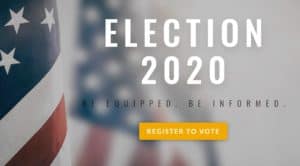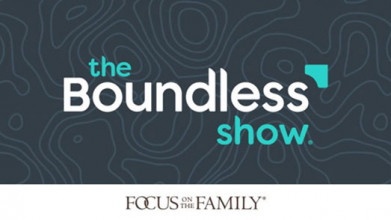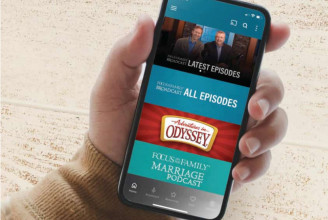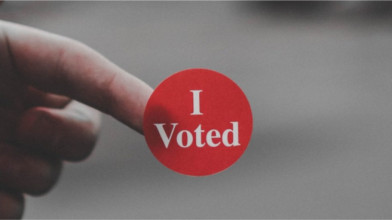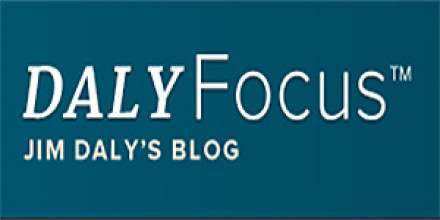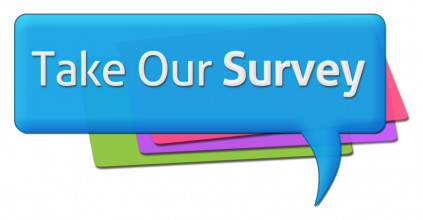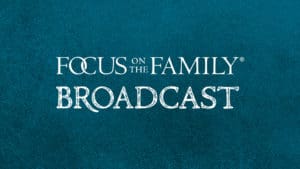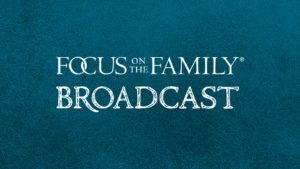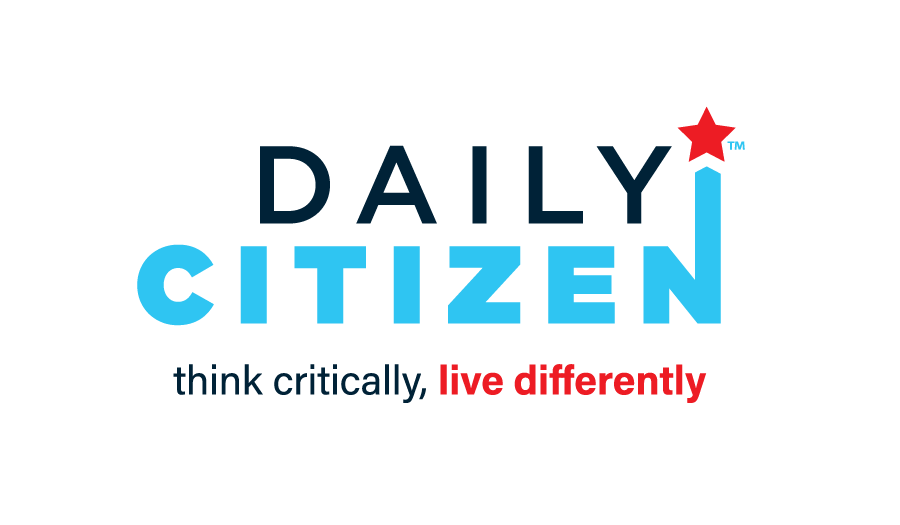Teaser:
Man #1: I’m concerned about honoring God.
Woman #1: I feel limited with my – when it comes to my choices.
Woman #2: I’ve got work to do. I need more information.
Woman #3: I feel the pressure of my community.
Man #2: I’m concerned my vote will cost me relationships and potential future jobs.
End of Teaser
John Fuller: Well, maybe you can relate to those comments and you feel overwhelmed and maybe ill equipped to vote this year. Well, today on Focus on the Family, we’ll review why it’s so important and valuable for you to stay involved in the political process and why your faith perspective, especially in this year’s election, is essential. Your host is Focus president and author Jim Daly. And I’m John Fuller.
Jim Daly: John, I can’t believe Election Day is only nine weeks away. Tuesday – mark it on your calendar – November 3rd. And this is, like we often say, the – a monumental election year. Every election seems to be that, the most monumental of all. Why? Well, we need to exercise that freedom that we’ve been given. You know, when I go to vote, one of the things I think about are the many veterans I’ve met through Focus on the Family. Roger Sherrard, a friend of mine, who was on the battlefield in Vietnam and the number of men he lost as a commander in the battlefield. That’s a picture for me to think, what price was paid for me to vote on November 3rd? I think of Roger Sherrard. Um, I hope that there is something motivating you in a similar way to get out and vote. We’re not gonna tell you how to vote. We shouldn’t do that, and we can’t do that. But we want to cover some of the issues and what’s at stake in our country from a variety of directions. You know, I’ve traveled, John, to 70 different countries and I’m telling you, the first time I came back from my first international trip all those years ago, I did – I knelt down and kissed the tarmac when I got here because our country has something that is priceless. And these are the things that are at stake, freedoms that are at stake, religious freedoms, expression, the things that I think we take for granted so often. Yet, people have paid with their life to maintain these freedoms for us.
John: Yeah, and it’s, uh – it’s not a perfect system. There are imperfect people and the process gets messy. There are contentions. But still, I agree with you. We have something that really is special here in the country.
Jim: We do, and we want to address as we stared today with, uh, a discussion about it. In fact, John, we’ve invited two great guests to help us navigate these issues. John Stonestreet is back with us. He’s the president of the Colson Center for Christian Worldview and a good friend of mine. He writes and speaks on faith and culture, theology, education, politics. If you don’t get his morning blog, you definitely should sign up for it at the Colson Center website. He’s also the host of the popular Breakpoint broadcast and podcast.
Jim: Welcome, John.
Mr. John Stonestreet: Thanks, Jim. Thanks, John.
John F.: And we also have Lisa Anderson, our colleague here, who heads up our ministry to young single adults, who is an author and host of the weekly Boundless broadcast and podcast. And it’s great to have you here.
Miss Lisa Anderson: Good to be here.
Jim: All right. Let’s kick it off. John, can you believe that it’s been four years. We were here in 2016…
John S.: We were.
Jim: …Having this discussion before the election. So, it’s good, like I said, to have your back to talk again about what’s going on in the culture. And Lisa you’ve brought some prerecorded comments from voters who express their concerns and struggles about this year’s election. And we’re going to share some of those observations that you were able to get into. And, in fact, you’re in some of these comments as well.
Lisa: Mm-hmm. (Laughter)
Jim: So, let’s take a listen.
Michael: It seems for a lot of people that politics has replaced religion and they’re looking for this godlike figure to solve all of their problems. And the – and the government will just never – will never do that. That’ll never be the case.
Camila: And I feel like we’re in this stage in our society where we’re just in a mob mentality. Like, I go on social media and everyone’s just yelling, and I can literally hear it through my screen, everyone just being so angry.
James: You know, each party has different concerns for different groups of people. If I vote for one, am I supporting some people, but then am I neglecting others? And can I do that with the good conscience?
Lisa: This idea that I used to like this elevated idea of I’m going to vote for a statesman. I’m going to vote for someone who represents everything that’s great about the country I was born in, about the issues that I love about… And that’s kind of taken off the table to the point where I’m just gonna be honest, I mean, when I talk to friends who – especially those who aren’t here in the States, I feel like I have to give all these qualifiers about like, well, you know, this is how our process works and this is why it isn’t perfect. (Laughs)
Jim: John, let’s pick it up there. That one comment about the combative nature, the mob mentality, I think she said, of what we’re experiencing in politics today. You know, we think it’s unique, but when I read, you know, the mob mentality during Lincoln’s election, for example, I mean, it was pretty brutal the way the press would attack Lincoln in that moment. And, you know, other presidents, too. Andrew Jackson. I mean, you can go right through the list. It wasn’t a kind process 100 years ago. It was a brutal process then like it is today.
John S.: You’re right. It was. Maybe one of the differences now is the 24 hour news cycle, the constant social media world that we all live in. In fact, a recent study just found the more people spend on social media, the less informed they actually are. And as Andy Crouch showed recently on a – on – on a presentation that we had, we need we probably need less information and more context. And I think that’s really one of the things that is a feature of this political cycle and maybe the last couple. I mean, you’re right. I remember the even more recent presidents impressive – on each side being, you know – attacking character unnecessarily; you know, making broad assumptions; impinging motives and all that. None of that’s new. But I tell you, it is so noisy in our world. It is such a noisy time to be a citizen, that blocking some of that out or at least discerning and navigating your way through it is – is, I think, more difficult than ever. So, I sympathize (laughter) with that comment, you know, myself.
Jim: Yeah. Lisa, that tone of apathy – you know, does it really matter? I mean, my vote – it’s one vote. Why does it even matter? But it does matter. And this is part of democracy. And not many nations, not many people, have had the privilege to live in democracies. It’s a relatively new phenomena in human history. And speak to that person who’s apathetic. You represent Boundless here at Focus. And you speak to young single folks who probably express that – this fatigue
Lisa: Yeah.
Jim: What are you hearing?
Lisa: And that’s where I would say it’s probably more of a disconnect than an apathy, because they’re – you know, when you talked at the front end of the show about, you know, the idea of like these veterans that you know. I mean, my average listener to my show has no real connection to someone who served in a war. Maybe they have a grandpa who is in Vietnam or maybe, you know, but it’s gonna be a couple generations removed. So, this idea of like what our country went through and all – you know, what they’ve read in the history books, maybe. But as far as a real connection to, “Yeah. Okay. Why? Remind me again why we love our country?” It’s – it’s often not there. And so, they’re just in this marketplace of ideas on social, where they’re hearing the yelling. You heard a listener say that. And they’re kind of like, “Okay, really? Does this…? You know, is – is America great? Should it be great? What is this look like? How should I feel about this? My friend next door doesn’t really think so. And I don’t want to be this, you know, weirdo who is yelling at them about stuff.” So, they’re conflicted.
John S.: You know, going back to an earlier comment by one of the listeners. I also resonated with that with that first comment where many people think politics has replaced religion. As religion has become seen more and more, even by people of faith, as a more and more privatized, sort of, you know, my relationship with my God sort of view and not as a commitment to an entire view of reality, then something has to take the place of – of God. Something has to take the place of Providence in terms of governing and orchestrating history, and for many people, that’s become politics. So, we remember Christ is risen and that Christ is Lord. That means we cannot be despairing because the future is secure. But it also means we know Who is writing this story of history. And it’s not the one in the White House. As Rick Warren said, “It’s not the one in the White House, it’s the One on the cross.” And when we can keep that straight, that’s, I think, really great.
Lisa: Yeah. And I think, John, it’s so interesting how, you know, we look at – you talk about that and where our allegiance lies. Election night people treat it – and I’ve been guilty of this in the past – we treat it like it’s the Super Bowl. People make snacks. They have people over. They’re rooting for, quote, “their team.” And it becomes so – they’re so wrapped up in it emotionally that we’ve been talking about this at Boundless. We’ve got to take the passion out of politics. And by that, I mean this idea that we’re going to be – we’re going to give our allegiance to a certain candidate or to a certain platform or to… And it’s going to be our be all end all. And our – you know, we know from Scripture our allegiance belongs to one team and that is Christ’s and that is where we have to sit in this. And, you know, I love that the – the, um, passage about, you know, Jesus saying, “Render to Caesar what is Caesar’s.” Because what He’s saying is whose image is on this coin? It’s Caesar’s. Whose image is on you? That’s God’s. You belong to God, so figure out what side you’re on and play the game accordingly
Jim: The difficulty in that, Lisa, is that some things resonate more with, you know, a biblical worldview than other things. And again, I’ll use life as an example. You know, we have a wonderful program here through Ray Vander Laan called That the World May Know. I’ve had the privilege of traveling to Israel with him. I would say the number one thing that he’s saying is an affront to God is the taking of innocent human life. I mean, you learn that walking through Israel with Ray. That is like at the forefront of God’s anger toward human beings when we take the life of innocent people. And, uh, you know, that for us as Christians, that is abortion. And you can argue about that. But we believe life starts at conception. And when a politician steps up and says, “Okay, I’m going to defend that position, I’m going to defend a pro-life position.” It becomes very hard for us to look the other way. And, you know, again, I’m not getting into the party issues. The point I’m trying to make is, given what you just said, Lisa, how do we as Christians line up Biblical values with party platforms and then say, “Okay, this best represents what I believe”? You’re not going to have a perfect situation, but, um, we’ve got to be critical about those things that we’re supporting, right?
Lisa: Yeah.
Jim: Let’s have both of you answer that.
Lisa: No, I think that’s true. And that’s why I think I’m not saying we don’t care about the issues. I’m just saying we have to be dispassionate about the candidates and the emotion …
Jim: That is fair. I can agree with that.
Lisa: …So, we line up all the issues and we – we put them up against Scripture. And that’s where you have – because, again, you know, someone will argue, Jim, of course, you know, Jesus cares about the pre-born and we’ve got to be after that and we’ve got to and not just again – we’ll probably get into this – at the federal level, but right where we are with the women, the dads in our own communities who are making these decisions. But, you know, God also cares about the refugee, the immigrant…
Jim: Correct. Absolutely.
Lisa: …So, we’ve got to make the arguments there of, like, what are the issues? What’s at stake? How are we going to look at Scripture and vote accordingly and take the – the personalities and the crazy out of it.
John F.: Mm.
Jim: And yeah. Let’s jump back to that panel discussion. They are addressing another issue. Let’s listen in.
McKenzie: We have a responsibility not to stay silent, especially when we come across those closedminded people who are like, “Oh, I’m just going to move to Canada, I’m going to leave the country.” But I think on the other side of that as well, we can’t – I’ve seen it. A number of – of Christians also say, “Well, then, okay, go. Like, if you don’t like it, then just get out.” And I don’t think we can do that either.
(LAUGHTER)
We can’t – we can’t stay silent. But we also just can’t write these people off and refuse to engage like we have to – like you were saying – we have a responsibility to engage and try to educate them.
Sharen: If we would sit at the table, communicate, put down our gauntlets, put down our boxing gloves and work together, communicate, communicate, communicate for lives to change and therefore policies to change, too.
Michael: Despite what you may think, we each have – we typically have some type of common ground with – with other people. You know, the human element usually provides something there. And so, finding that common ground and probably in the first conversation, not even talking about politics at all, because people will listen to you when they know that you actually care about them as an individual. And so, it starts with – with a relationship.
Jim: Let’s just have both you respond to those comments. John?
John S.: You know what? I think there are some election cycles where the issues are more important than others. I mean, you know, if you have an election cycle where the most important thing, you’re wrestling with is, you know, whether we’re going to have an interstate highway system, you know, and how we’re going to tax people who…
Jim: Boy, it feels like we’re so past that.
John S.: …Well, that – well, that’s what I’m saying.
Jim: (Laughter).
John S.: I mean, right now, what’s – what’s at stake for this – in this particular election are really, really important issues. And one of the things that I think is quite important that was said earlier and even reflected in this panel is that we put so much attention on what’s happening at the very top of the ticket where – when it comes to life, when it comes to freedom of religion, when it comes to how we’re going to handle the education of our children What happens in local races, what happens with local ballot initiatives, is far more important than what’s happening at the White House. And still, what’s happening at the White House really matters because we’re talking about Supreme Court nominations and that sort of thing. And so, that’s why we have to remember when we look at these and try to engage the political process, first of all, it is a – it’s something we have to do because it’s an act of stewardship, right? It’s – it’s – it’s a good that God has given us the opportunity to participate in. That’s not the case throughout most of human history. And, you know, the Scripture defines sin not only as what you do but the good that you fail to do, and I think voting is one of those things. It’s a good you have an opportunity to do, so – so do it. The other thing that I think is probably helpful is because the 24 hour news cycle and the Twitter and the conspiracy theories and the fake news that gets thrown around, we get so fixated on the personality of a candidate and how it’s portrayed. Now, don’t get me wrong. Character of the candidate always matters, right? But so does policy, right? What are they going to do? Not only that, but so does the whole team they bring to the – the – the table. No candidate is just them. Especially when you talk about who’s the President. You’re talking about 3,000 other people that are going to staff different department heads. They’re going to develop policy. They’re going to carry out executive orders and try to move things through Congress and deal with lobbyers and all that other stuff. And then, of course, you’ve got the whole level of appointments, right? I mean, who are the other people that they’re…
Jim: Absolutely.
John S.: …Going to put in place? So, we get so narrow in our view of how we’re going to vote, and we need to look at that big picture as much as possible.
John F.: Hmm. This is Focus on the Family with Jim Daly. And our guests today are John Stonestreet and Lisa Anderson, as we explore some of the thorny issues regarding the upcoming elections. We do have resources for you. Stop by our website. It’s focusonthefamily.com/broadcast. And you’ll find those and then follow us along on the Daily Citizen feed. Check John’s blog and newsletter’s out. We’ve a lot here for you to stay informed.
Jim: John, I want to move – and you touched on it – to religious liberty because, man, that is in the news every day. I’m thinking of Pastor John MacArthur in California who’s been under the boot of the governor there for holding church services. The pandemic has caused this divide. We had the Supreme Court case, the quick ruling on the Nevada church wanting to basically follow the same guidelines given to casinos in Nevada, which meant that, you know, approximately half the capacity of a casino you could have…
John S.: Right.
Jim: …In there, but only 50 people in a church. So, why not just apply the casino guideline to the church guideline, right?
John S.: Yeah…
Jim: To have half capacity be available for the church. So, I – you know, talk about where we’re at with religious freedom and in particular how the pandemic is playing in this debate.
John S.: Well, I think there are a lot of preexisting conditions to the pandemic that we’re seeing, you know, rise to the surface and be, you know, exaggerated during this time. And religious liberty is really one of them. But it’s even more fundamental than that. It’s how religion itself is perceived in society. We’ve seen elected officials. You just named two states. I can name a couple more talking about marriage. We’ve seen the same thing there. But elected officials that really think religion is kind of an irritant, almost like it gets in the way. Like, you guys – you can really see the language coming from – from certain elected officials at the state and local level that kind of see religion as, you know, being a fan of the Cubs versus the, you know, the Cardinals. So, to demand any sort of accommodation to worship, which we see and gather and to assemble and to speak, which we actually see – I think it’s in the very First Amendment, isn’t it? It’s seen as an …
Jim: Very clearly.
John S.: Right. It’s seen as an irritant. It’s seen as something else. So, this is a preexisting condition to the challenges we see in religious liberty. And we’ve also seen, as we know, that there is an ongoing conflict between religious freedom and sexual freedom in our society. And that has hit the level of state level propositions, ballot initiatives, legislative policy advances. I mean, we can just kind of – and Supreme Court decisions, obviously.
John S.: So, we can go down the line and see that elections matter when it comes to religious liberty. Now, elections aren’t all that matter. Again, we’ve got preexisting conditions on how Christians understand their own faith, as well as how the rest of the world sees Christians. For many people, religious freedom is a synonym for license to discriminate or a synonym for to advance my own special cause. You know, religious freedom for me, but not for thee. And so, we’ve got to get clear on what religious liberty is. That’s a pre-political, cultural level sort of conversation. But, wow, between here and there elections really do matter.
Jim: Lisa, let me ask you this question because I think it’s important, um, for the Christian that despises the political environment, because it’s the art of compromise and you can’t be a purist in that environment. And no one person represents, you know, straight down the line Biblical values. There’s gonna be these wiggles, you might say. You could become apathetic and say, “You know, I am a citizen of heaven, not of this world. Therefore, I’m not going to participate in it because I don’t want to have to, you know, kind of compromise my position.” What do you say to that person in terms of being in a democracy? We’re not in the Roman Empire. We don’t have decrees from Caesar coming down, which is what Jesus was in. I mean, they had to live with what they received – right? – on this earth. And Jesus kind of said that give under Caesar what says and unto God what is His. So, how do you work that out in terms of the apathy, so it doesn’t drive you toward nothing?
Lisa: Right. Right. And that’s where, you know, wouldn’t even in that previous clip where the – the commenter was talking about, “Oh, you know, I might have to move to Canada.” That was actually a conversation we were having where I had thrown that out there, because I have friends that I’ve seen on social media on both sides of the aisle who have said, “If the other candidate wins my family… We’re just going to move. We’re going have to move.” So, it’s this throwing up the hands. And the fact is we all have to learn the art of communication and the art of compromise. It’s going to it’s going to happen on stuff like this that is not a faith issue. It’s not a Biblical, you know, core to our faith. And so, what does that look like? Because we can’t just throw up our hands and disengage entirely. We have to realize and, you know, my young adults I talked to who do not like it when I say this. A vote – to your point, Jim – no one is going to perfectly represent the heart of God. No one has the corner on the truth on every one of these issues, so you are going to have to pick. You know, you have to figure out like, what is this look like? But what we need to do is be able to do this in a way that is not – you know, I see this going so hand-in-hand with what we talk about a lot at Boundless right now. In fact, it’s blowing up this week. This whole concept of cancel culture. That if – if someone disagrees with you, you just cannot have a conversation with them. You need to just write them off. Everything about them is evil because you disagree with one thing that they say. We can’t do that. We have to be in the arena having the conversation, staying engaged, because if we disengage and become apathetic, to your point, then that just shows that, you know, we feel powerless in that. And we know that as Christians, we are not powerless.
John F.: Hmm.
Jim: That’s so true. But participating in democracy is a responsibility I think that we’re all called to and if we just step back in that apathy, Lisa, like we were talking about, I think we really – we fumble what so many people have given their lives for us to express. So, be engaged. Be informed. Get out and vote November 3rd. That’s the point. And I hope today’s discussion has motivated you and perhaps you can send this to a friend or family member that needs a little kick in the backside to get them out of the rut and get them engaged with what’s happening. Uh, we can do what we can do, but we’ve got to do it. And I hope you will do that on November 3rd. John, when we’ve addressed the election of voter responsibilities in the past, you’ve pointed out an important verse, which is Acts 17, that refers to how God placed us in this certain time and place for a reason and for a purpose. Explain that position.
John S.: Yeah, it’s one of the truths of Scripture that some days I don’t like as the dad of three kids. Right? I mean, I don’t like everything I believe. But Paul, when he was talking to the epicurean and stoic philosophers in Athens and you can find this – Luke records this in Acts chapter 17. He – he – he introduces God to these pagans. And he – he says a number of things that it’s really fascinating. And you can actually see how he’s directly engaging the philosophy of epicureanism and the philosophy of stoicism and it’s really interesting. One of the ways he does that, but with a truth claim is God determines the exact times that we live and the boundaries of our dwelling place. In other words, it’s not an accident that we’re in this time and in this place. And that’s why, you know, you kind of laugh when people are like, “I’m moving to Canada.” Or “I’m moving to New Zealand.” And by the way, the grass isn’t – well, the grass is definitely greener in New Zealand…
(LAUGHTER)
John S.: …But the political grass is not, right? I mean it – there’s not a place where there’s not a fall, but there is a place where God – a time and a place where God has called us to. And it’s also, by the way, Jim, the way to love our neighbor. Policy matters because people matter. Policies don’t matter because our side matters. Unfortunately, we hear that way too often. But as we say around the Colson Center, ideas have consequences. Bad ideas have victims. And policies are ideas put into place to order society. And if they’re bad ones, then people are actually going to pay the price. I mean, look, you can just see the dramatic difference between different administrations and their policies on education, their policies on health care, their policies on abortion, their policies on the place and role of religion in the public square. These things have victims. And so, to miss an opportunity to speak into that process is to miss an opportunity to love our neighbor.
Jim: Hmm.
Lisa: Yeah. I think, John, to both your points – you know, what I would say is not only has God ordained what – what the times and seasons are for His people, but for all authorities, for everyone. You know, I think of John 19, where Jesus says to Pilate like, you would have no authority over Me if it had not been given to you by God. And so, it’s like, yeah, okay, we can be okay with that because it’s not like, you know, again, if – if whatever our candidate is wins, then we’re okay. And if he doesn’t win, then we’re not okay because Jesus wins. And so, and then regarding the local statement, I think it’s so important to say that, you know, we as Christians need to not rely on a vote or a platform or a government policy to solve the ills in our community. We’re called to do that as the church. And so, if we’re not – you know, if we think, well, okay, I’m voting and so check it off the box, I’m done. Yeah, you better be going back in your community and loving your neighbor and helping – you know, figuring out solutions for the poor and figuring out what that looks like, because that is the hands and feet of Jesus that were to do the rest of the four years (laughs) when we’re not casting a ballot.
Jim: Yeah, that’s well said. The point is, get out and vote. That’s what we’re trying to communicate. Take on that responsibility. November 3rd, that’s your chance in a democracy to shape the policies that John was referencing for the good of the people or for the ill of the people. And I think to some degree, we’re responsible for that and we need to take it seriously. So, again, get out and vote on November 3rd. We’ll point our listeners and viewers to the Boundless website, Lisa, where you conducted that panel discussion. There’s a lot more that we didn’t cover out that obviously and I think people would find it really intriguing. We’ve also got a helpful resource for families. It’s free. It’s called The Daily Citizen. I read it every morning. It provides you with timely and relevant analysis of current events and cultural trends from a Biblical worldview like we’ve talked about today. And as we’ve indicated, the news and issues can be overwhelming at times. So, we just take those things that have happened that we think are consequential from our Christian worldview and put them in an easy to find location. And, of course, I’d encourage you to check out the great resources at the Colson Center, led by my good friend John Stonestreet and we’ll have a link to their website as well.
John F.: Indeed, we will, Jim. And we’ll link over to your blog as well where you have a lot of comments on the culture and what’s going on out there. So, all of these links and resources, can be found at focusonthefamily.com/broadcast. Or call 800, the letter A and the word FAMILY if you have any questions.
Jim: Lisa, John, thanks for being with us. This has been really good.
Lisa: Thanks, Jim.
John S.: Thanks.
Jim: Well, let me speak to those who help us each and every month, perhaps, or at least with a gift here and there. Thank you so much for taking care of the fuel that drives the engine here at Focus on the Family. And we appreciate it. If you haven’t given to Focus or it’s been a while, I’d really encourage you to think about sending a gift today. We need to hear from you, especially during this time. I mean, covid has really taken a bite out of everybody’s budget, I’m sure, including local churches. Be sure to take care of your church and then if you can, help us here at Focus to continue to do what we do here, to strengthen families each and every day.
John F.: Yeah, we’re wrapping up our fiscal year here in the next few weeks. And so, we’d love to hear from you. Our number again, 800 A-FAMILY. Or you can donate online at focusonthefamily.com/broadcast. Well, on behalf of Jim Daly and the entire team, thanks for joining us today for Focus on the Family. I’m John Fuller, inviting you back as we once more help you and your family thrive in Christ.










